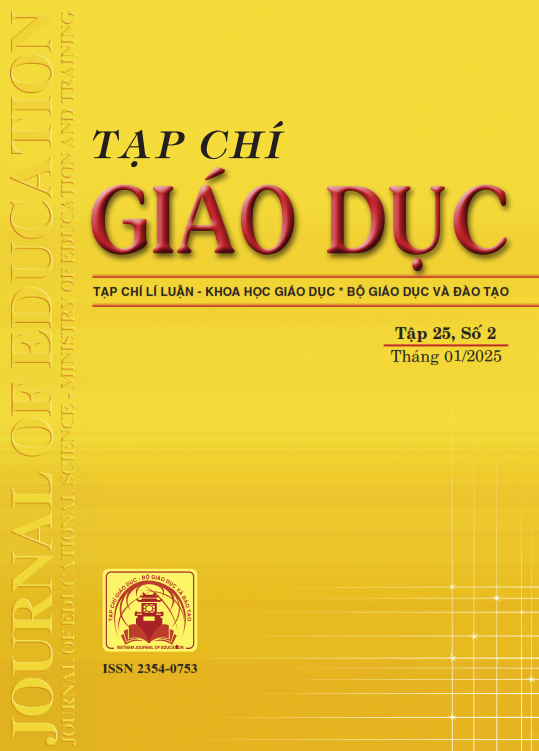Các khung lí thuyết nghiên cứu về bản sắc giáo viên
Tóm tắt
Teacher identity is a decisive factor influencing teaching and learning outcomes. Despite the large amount of empirical research on teacher identity, there have been only few studies conducted to review the theoretical foundations widely used to investigate teacher identity. This article presents five main theoretical frameworks for researching teacher identity. The results from this study indicate that positioning theory, communities of practice theory, self-determination theory, dialogical-self theory, and dynamic systems model of role identity are commonly employed as theoretical bases for exploring teacher identity. This article would serve as a reference for prospective teacher identity research.
Tài liệu tham khảo
Arvaja, M. (2024). Constructing teacher self in a dialogue between multiple I-positions: A case from teacher education. Journal of Constructivist Psychology, 37(4), 451-471. https://doi.org/10.1080/10720537.2023.2276275
Beauchamp, C., & Thomas, L. (2022). Identity learning in teacher education. In M. A. Peters (Ed.), Encyclopedia of Teacher Education (pp. 786-790). Springer.
Davies, B., & Harré, R. (1990). Positioning: The discursive production of selves. Journal for the Theory of Social Behaviour, 20(1), 43-63.
Grant, C., & Osanloo, A. (2014). Understanding, selecting, and integrating a theoretical framework in dissertation research: Creating the blueprint for your “house”. Administrative Issues Journal, 4(2), 12-26.
Harré, R. (2012). Positioning theory: Moral dimensions of social-cultural psychology. In J. Valsiner (Ed.), The Oxford handbook of culture and psychology. Oxford University Press.
Hermans-Konopka, A., & Hermans, H. J. M. (2010). The dynamic features of love: Changes in self and motivation. In J. D. Raskin, S. K. Bridges, & R. A. Neimeyer (Eds.), Studies in meaning 4: Constructivist perspectives on theory, practice, and social justice (pp. 93-123). Pace University Press.
Hermans, H. (2018). Society in the self: A theory of identity in democracy. Oxford University Press.
Kaplan, A., & Garner, J. K. (2017). A complex dynamic systems perspective on identity and its development: The dynamic systems model of role identity. Developmental Psychology, 53(11), 1-47.
Kaplan, A., & Garner, J. K. (2018). Teacher identity and motivation: The dynamic systems model of role identity. In P. A. Schutz, J. Hong, & D. Cross Francis (Eds.), Research on teacher identity: Mapping challenges and innovations (pp. 71-82). Springer.
Kayı-Aydar, H. (2019). Positioning theory. In Positioning theory in applied linguistics: Research design and applications (pp. 1-26). Springer.
Klimas, A. (2023). Teacher identity (re)construction in the process of EFL teacher education. In M. Baran-Łucarz, A. Czura, M. Jedynak, A. Klimas, & A. Słowik-Krogulec (Eds.), Contemporary issues in foreign language education (pp. 51-66). Springer.
Kovalčikienė, K., Stelmokienė, A., Gustainienė, L., & Genevičiūtė-Janonė, G. (2019). University teachers' professional identity: A role of self-determination theory. Psychological Applications and Trends 2019, 307-309. https://doi.org/10.36315/2019inpact078
Lee, J. C. K., & Yin, H. B. (2011). Teachers’ emotions and professional identity in curriculum reform: A Chinese perspective. Journal of Educational Change, 12(2011), 25-46. https://doi.org/10.1007/s10833-010-9149-3
Mansouri, B. (2021). Understanding EFL teachers' identity construction in a private language school: A positioning analysis. TESL-EJ, 25(2), 1-17.
Martin, A. D. (2022). Teacher identity perspectives. In M. A. Peters (Ed.), Encyclopedia of Teacher Education (pp. 1858-1860). Springer.
Ryan, R. M., & Deci, E. L. (2000). Self-determination theory and the facilitation of intrinsic motivation, social development, and well-being. American Psychologist, 55(1), 68-77. https://doi.org/10.1037/0003-066X.55.1.68
Sadek, H. M. B. E.-D. (2020). Teachers' perceptions of professional identity and communities of practice. Master's thesis. The American University in Cairo.
Schutz, P. A., Hong, J., & Francis, D. C. (2019). Research on teacher identity: Mapping challenges and innovations (Vol. 16). Springer.
Van Veen, K., & Sleegers, P. (2009). Teachers’ Emotions in a Context of Reforms: To a Deeper Understanding of Teachers and Reforms. In: Schutz, P., Zembylas, M. (eds) Advances in Teacher Emotion Research. Springer, Boston, MA. https://doi.org/10.1007/978-1-4419-0564-2_12
Wang, R., Elahi Shirvan, M., & Taherian, T. (2021). An ecological study of identity in teaching English as a foreign language in light of the dynamic systems model of role identity. Frontiers in Psychology, 12, 1-11. https://doi.org/10.3389/fpsyg.2021.799418
Wenger, E. (1998). Communities of practice: Learning, meaning, and identity. Cambridge University Press.
Tải xuống
Đã Xuất bản
Cách trích dẫn
Số
Chuyên mục
Giấy phép

Tác phẩm này được cấp phép theo Ghi nhận tác giả của Creative Commons Giấy phép quốc tế 4.0 .












